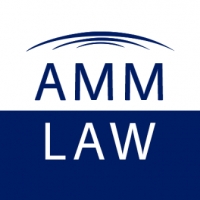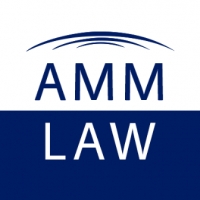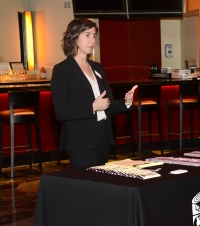AMM congratulates our 2018 Super Lawyer and Rising Star attorneys named in the 2018 Super Lawyer listing by Thomson Reuters.
Jessica Pritchard, chair of the firm’s Family Law practice group, was named one of the “Top 50 Women” again this year, and one of Philadelphia’s Top 100 attorneys by the publisher of Pennsylvania Super Lawyers magazine. Ms. Pritchard has been included in the Super Lawyer listing for the past four years.
Elizabeth Fineman, an associate in our Family Law department, was named a 2017 Rising Star by the same publication for the sixth year.
Both Pritchard and Fineman concentrate their practices exclusively in Family Law. Super Lawyers is a rating service of outstanding lawyers from more than 70 practice areas who have attained a high-degree of peer recognition and professional achievement. This selection process includes independent research, peer nominations and peer evaluations. To learn more, please visit www.superlawyers.com.
AMM congratulates our 2018 Super Lawyer and Rising Star attorneys named in the 2018 Super Lawyer listing by Thomson Reuters.
Jessica Pritchard, chair of the firm’s Family Law practice group, was named one of the “Top 50 Women” again this year, and one of Philadelphia’s Top 100 attorneys by the publisher of Pennsylvania Super Lawyers magazine. Ms. Pritchard has been included in the Super Lawyer listing for the past four years.
Elizabeth Fineman, an associate in our Family Law department, was named a 2017 Rising Star by the same publication for the sixth year.
Both Pritchard and Fineman concentrate their practices exclusively in Family Law. Super Lawyers is a rating service of outstanding lawyers from more than 70 practice areas who have attained a high-degree of peer recognition and professional achievement. This selection process includes independent research, peer nominations and peer evaluations. To learn more, please visit www.superlawyers.com.
I had the pleasure of revisitng the issue of training to avoid or address harassment and discrimination in the workplace at the Lower Bucks Chamber of Commerce ECONference 2018 on May 23, 2018. The questions from participants reminded me that training is a valuable tool not only for risk prevention, but also to improve workplace culture.
Training has become a “check the box” activity: the employer gets to say that it provided training, in the event of a claim. The employees are required to attend in order to keep their jobs, and so they attend and zone out. Employer and employees are going through the motions. The lawyers told them to train, so the employer is training.
Here’s what I’ve learned: the serious offenders, those who engage in serial harassment, inappropriate relationships or even assault, are going to engage in that behavior no matter what training you provide. An employee who lacks the insight to know that certain behaviors are unacceptable (everywhere, really) will not have an epiphany during mandatory employee training. One-on-one training often helps in these situations, but not always, and not fundamentally (that is, the employee will know what to do to stay employed, but will not really care that the behavior was inappropriate).
Employers should provide training – it is good risk management for certain employers. But, perhaps it should be a more sincere activity on both sides: employers should consider more interactive training, smaller groups and individualized training for departments. Employers should engage in self-evaluation of workplace culture prior to planning the training.
Further, if the goal is prevention of harassment, hostile work environment claims or other unacceptable workplace behaviors, generalized training is not always the answer. Instead, employers should remember that culture comes from the top. If officers, supervisors and managers maintain professionalism, it sets the tone. It might be valuable to warn and provide one-on-one training to managers who do not demonstrate professional behavior, but in the end, appropriate workplace behavior should be a qualification for any leadership role.
No lawyer will ever advise an employer not to provide training, but perhaps it is time to be more thoughtful about what training looks like for specific employees. Avoiding litigation cannot be the only goal, or the training will never work. I frequently work with employers to come up with meaningful training plans that comply with the law, and are appropriate for their business.
Tattletale: Supply-Chain Investigations and the Attorney-Client Privilege
Written by Susan MaslowGoods Tainted by Forced Labor
Reprinted with permission from Business Law Today April 2018.
The global fight against child labor and forced labor has been led for decades by the International Labor Organization (ILO). The ILO’s most recent estimate is that 25 million people around the world, including millions of children, are currently subjected to forced labor. Under U.S. law, section 307 of the Tariff Act of 1930 prohibits the importation of merchandise mined, produced, or manufactured, wholly or in part, in any foreign country by convict, forced, or indentured labor. This law gave the U.S. Customs Service (now the U.S. Customs and Border Protection (CBP)) authority to seize commodities imported into the United States where forced labor was suspected to have been used anywhere in the supply chain.
The Tariff Act defines “forced labor” as “all work or service which is exacted from any person under the menace of any penalty for its nonperformance and for which the worker does not offer himself voluntarily.” Products of forced labor include goods that were produced by convicts and indentured laborers. The ILO defines forced or compulsory labor as service that involves coercion—either direct threats of violence or more subtle forms of compulsion under the menace of any penalty. Goods made by child labor, defined as work that deprives children of their childhood, their potential, and their dignity and that is harmful to their physical and mental development, are included in the forced-labor prohibition especially when combined with any form of indenture. Such tainted merchandise is subject to exclusion and/or seizure by the CBP, may lead to corporate criminal liability, and could even support prosecution of culpable employees individually.
The Trade Facilitation and Trade Enforcement Act of 2015 (TFTEA) removed the “consumptive demand” exception to the United States Tariff Act of 1930, which was a commonly exploited loophole to the prohibition against importing products of forced labor. Prior to the new provision, CBP used the law only 39 times since 1930 to apprehend goods tainted at some point from creation to delivery by forced labor. Since the passage of TFTEA, CBP has issued four new Withhold Release Orders (each a WRO) on specific goods from China. Although 2017 saw more antidumping and countervailing duty orders and intellectual property rights protection activity under TFTEA, there have been no published detentions to date, although CBP has pledged to the U.S. Congress that more import bans under section 307 are forthcoming.
Sue Maslow and Jamie Jamison of Antheil Maslow & MacMinn participated in the Bucks County Bar Foundation' s Learning with Lawyers program. The program is tailored to 5th grade elementary students in Bristol Borough School District. The Foundation provided each student with a copy of If You Were There When They Signed the Constitution which was discussed in the classroom.
The Bucks County Bar Foundation is the charitable arm of the Bucks County Bar Association. Its mission is to promote and support programs, organizations, and individuals throughout Bucks County who are engaged in activities designed to foster respect for the rule of law, the advancement of rights, liberties and protections under the law as well as activities which have as a principal purpose the advancement of social justice for the individuals, families and communities of Bucks County.
Supreme Court Finds ‘Service Advisors’ Exempt from Overtime Rules
Written by Patricia CollinsReprinted with permission from the April 18th, 2018 issue of The Legal Intelligencer. (c) 2018 ALM Media Properties. Further duplication without permission is prohibited.
The Supreme Court’s decision in Encino Motorcars, LLC v. Navarro interprets a very specific exemption to the overtime rules imposed by the Fair Labor Standards Act, 29 U.S.C. 201, et seq. (“FLSA”), but the Court’s language and reasoning have game-changing ramifications. The Court’s rejection of the principle that courts should narrowly construe exemptions to the FLSA turns decades of FLSA caselaw on its head.
The facts of Encino Motorcars are deceptively narrow. Employees classified as service advisors for a car dealership challenged the car dealership’s classification of the service advisors as exempt from the FLSA. The FLSA requires that employers must pay overtime to employees who work more than 40 hours in a week. 29 U.S.C. § 207(a). The dealership claimed the exemption under a statutory exemption that applies to car dealerships. 29 U.S.C. § 213. Specifically, the section in question exempts from overtime pay requirements:
Any salesman, partsman, or mechanic primarily engaged in selling or servicing automobiles, trucks, or farm implements, if he is employed by a nonmanufacturing establishment primarily engaged in the business of selling such vehicles or implements to ultimate purchasers.
The 2017 Tax Cuts and Jobs Act: Family Law Tip #4 – How much money can I take in a cash out refinance?
Written by Elizabeth J. FinemanPrior to the tax act, taxpayers who required additional cash for a variety of reasons, including buying our their spouse’s interest in the residence, would regularly refinance the mortgages on their residence for a larger amount. The benefit was that the mortgage interest on the refinanced mortgage could be deducted up to a $1,000,000 cap.
The passage of the Tax Cuts and Jobs Act has effected a huge change limiting the mortgage deduction in this scenario, which may have a significant impact on parties going through a divorce. The new law limits the amount of the mortgage to funds needed to acquire a residence, construct a residence or substantially improve a residence. So, if you are refinancing for one of these allowable expenses, and stay below the $1,000,000 cap, the interest would still be deductible. However, in a divorce that is often not the case.
In a divorce, the party retaining the residence will have to refinance the loans related to the residence to remove the other party’s name. Often, this will be both a mortgage and a home equity line of credit. Moreover, the party retaining the residence often has to refinance for a larger amount to make a cash payment to the other party to “buy out their interest” in the house. With the new law, the parties refinancing the marital residence to take cash out to pay off the other spouse will be limited to the principal balance prior to the cash out refinance in terms of the interest that can be deducted. For example, if the principal mortgage balance is $300,000 and the party retaining the residence is refinancing for $500,000 to pay off the other spouse, they will be limited for purposes of the deduction to the interest on the $300,000. Interest on the additional $200,000 cannot be deducted. In addition, there will be no deduction when the mortgage is refinanced to now include the home equity line of credit. Parties are going to have to give more consideration to the tax consequences and resulting true cost of retaining the residence.
Susan Maslow, Vice-Chair of the ABA Business Law Section Working Group to Draft Human Rights Protections in Supply Contracts, participated as Program Chair and one of six panelists in a CLE program at the ABA Business Law Spring Meeting in Orlando, Florida on Friday, April 13, 2018 entitled “Protecting Human Rights in Supply Chains: Moving from Policy to Action.” Speakers included practitioners in private firms, industry representatives from multibillion-dollar international businesses, and academics.
The program focused on the Working Group’s draft of a report with model contract clauses to protect the human rights of workers in international supply chains. The hope is that adopting the suggested text in supply contracts, purchase orders, and delivery documents will be more effective at preventing the kind of abuses that have recurred with horrifying frequency over the last few years, resulting in hundreds of deaths and countless injuries. The CLE program and materials include research and summary of recent and pending litigation in the context of violations of employee human rights, forced labor and child labor, domestically and abroad. The program drew on the knowledge and skill of those who have worked in the area, with perspectives from private practice, in-house lawyers, and law professors. The Working Group has been gathering feedback on the current draft of the report and model clauses and took the opportunity to gather more input from other business practitioners at the CLE program. The Working Group held a session following Friday’s program to discuss and digest the comments, to finalize the report and clauses, and to form a plan of national implementation.
Finally, Spring is here! It has certainly been a long, cold, snowy, and relentless winter. I want to take this opportunity to wish all of you a snow-free, warm and sunny Spring. As an employment lawyer, I'd like to do my part to help all of you employers maintain a care-free Spring mood by offering the following Spring cleaning checklist, which can protect your business from litigation and compliance risks.
Elizabeth J. Fineman has been named a Partner of the law firm of Antheil Maslow & MacMinn, LLP. According to Managing Partner, Bill MacMinn, “Liz is a an impressive lawyer, her work ethic, skill and professionalism make her well deserving of Partner status with AMM”
Ms. Fineman concentrates her practice on domestic relations matters and handles a variety of issues, including divorce, child support, alimony/spousal support, marital taxation, equitable distribution and child custody matters. She has handled many high-income support cases and complicated divorce matters involving an intricate knowledge of both family law and complex tax and financial issues. Elizabeth Fineman holds an LL.M. in taxation.









